RESULTS:
Clearance and Excavation
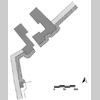
Figure 11 |
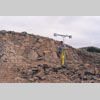
Figure 12 |
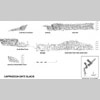
Figure 13 |
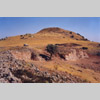
Figure 14 |
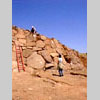
Figure 15 |
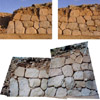
Figure 16 |
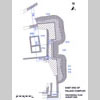
Figure 17 |
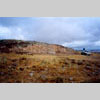
Figure 18 |
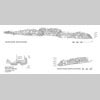
Figure 19 |
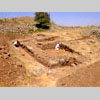
Figure 20 |
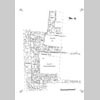
Figure 21 |
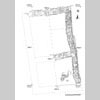
Figure 22 |
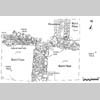
Figure 23 |
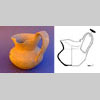
Figure 24 |
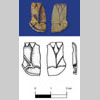
Figure 25 |
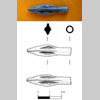
Figure 26 |
The programme of excavation
and clearance, started in 1996, has provided a wealth of information
that aids the interpretation of information collected by remote
sensing techniques. GIS allows this information to be classified
and entered into a database.
Continuation of clearance
at the Cappadocia Gate, started in 1999, is revealing details of
the constuction of the city defences. A new plan of the 'Cappadocia
Gate' was obtained (Fig.
11), the impressive double tower with a central recess flanking
the east side of the gate was revealed, evidence for the unexpected
extent of preservation of the inner gate chamber was obtained and
the existence of a small, secondary, Iron Age structure in front
of the easternmost tower was recorded. The impressive 5m high glacis
around the South-East Tower was cleared within a few days. Kemal
Gülcen recorded the sinuous cyclopean stone facing by photogrammetry
(Figs
12 and 13)
and photographs taken for rectification and 3D modelling (Figs
14 15
16). Whatever
combination of causes may account for the design, including perhaps
topography and structural strength, visual impact and architectural
form would appear to have been over-riding concerns. It appears
that there were sandstone crenellations atop the towers flanking
the gate and perhaps carried over a part of the gate passage. Further
evidence for the inclusion of timbers in the upper part of the towers
was revealed, but whether or not battlements were carried on overhanging
parapets remains moot.
Clearance and Test Trenches
in the “Palace Complex” area were excavated (Figs17)
and the information retrieved from the buried structures is to be
combined with evidence collected in 1996, 1998 and 1999. Clearing
of the entire sloping stone façade of the “Palace Complex”
(Figs
18 and 19),
was started in 1999 and completed in 2000; the entire stone glacis
was exposed and the photogrammetric records were completed. Plans
of excavated structures and buildings were drawn (Figs 20,
21,
22,
23)
and evidence from excavation also shed light on building materials,
building techniques and function of rooms, buildings and structures.
Exposure of monumental architecture was complimented by evidence,
from precise test excavation, for a taste in sumptuous objects,
eclectic diet and a range of ceramic vessels and information on
aspects of trade and industry (Figs 24,
25,
26).
Charcoal, obtained from flotation, demonstrated that substantial
timbers, now scant in the region, were once abundant.